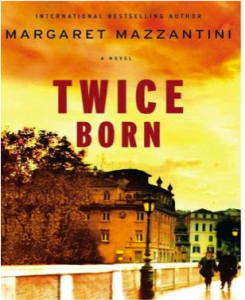What Grows in War-Ravaged Soil
Reading Twice Born is like taking a journey that, once started, has no turning back. It is something to be experienced, more than just read. It slowly sinks into your heart and, page by page, leaves you completely helpless, defenceless, as after a storm of mixed emotions. It is like being revealed the unspoken truth of human condition, with its eternal carousel of joy and sorrow, and turning it into a personal memory. So much so that, once you have finished the book, you can’t help but look around for your fellow travellers – Diego, Gemma, Pietro, Aska, Gojko – as if they were there, flesh and blood, still breathing the dust of war.

The fifth novel by Italian bestselling author Margaret Mazzantini, the second (after Don’t Move) to be translated into English, Twice Born challenges the traditional genre categorization, being a historical- political novel that brings us back to an almost forgotten chapter in our recent history – the siege of Sarajevo (1992-1996), during the Bosnian war – but also a powerful romance, centered around the compelling love story between the down-to-earth, resolute Gemma and the scruffy young photographer Diego. It is a story of loss and redemption, of motherhood and birth, of love and despair, which won’t be easy to forget.
After a call from Gojko, a long-lost friend from Sarajevo, Gemma, an Italian woman on her early 50s, boards on a flight from her native Rome to the war-scarred city where, 24 years before, she met Diego, the love of her life. On her side there is Pietro, her 16-year old son, who reluctantly accepts to be taken on a memory trip on the trace to dead father he has never known. Led by Gojko, a rough, kind-hearted Bosnian poet and tourist guide, the two of them go through the wounded landscape of Sarajevo, entering the scene of a great collective tragedy, which holds a captivating secret that concerns them both.
Jumping backwards and forwards in time and place, Margaret Mazzantini masterfully weaves past and present, moving from the lively alleys of Genoa, Diego’s native city, to the quiet chaos of Rome, from the pre-war fascinating landscape and cultural vitality of Sarajevo to the devastation produced by a fratricidal bloodshed. As the narrative goes on, and all events rush toward an unexpected climax, Gemma relives her stormy love affair with Diego, their efforts to cope with the painful evidence of her own infertility, the long ordeal of treatments and testing, adoption and surrogacy attempts, which eventually seem to tear them apart. While the story unravels, slowly but inexorably, the common destiny that binds all characters to Sarajevo is revealed and the maze of individual stories converges into the tragic, yet hopeful, history of a people.
All characters, and their intricate relationships, are superbly, almost cinematically, portrayed: the passionate, ambiguous friendship between Gemma, Diego and Gojko brings to mind the pure, bohemian relationship between Jules, Jim and Catherine in François Truffaut’s 1962 masterpiece, as frozen in the beautiful, iconic image of the three of them racing along a bridge.
It is no surprise that the book, which won the prestigious Premio Campiello and was a blockbuster success in Italy (selling over 800,000 copies, with rights sold in 15 other countries), will soon become a feature film, directed by Mazzantini’s husband Sergio Castellitto and starring, according to the latest reports, Emile Hirsch and Penelope Cruz.
There is a sort of duplicity, a painful richness of nuances even in the minor characters, which makes it difficult to frame them into preconceived representations. Just like the ex-Yugoslavian territory, all figures are in fact inwardly torn by opposing forces and feelings: through the lens of his camera, Diego powerfully embraces life, but is nevertheless devoured by his own passion; and Gemma, since the beginning of the story, struggles between “a benign life without highs and lows, without sorrows, without desires” and “another life that was bolder and more casual”; Pietro, for his part, with the rebel impatience of his youth and the secret story of how he came to life, embodies the contradictions of all human conflicts, proving that hatred and sorrow can still surrender to love and re-birth. Because, as the Genoese poet and songwriter Fabrizio De André sang, “Nothing grows out of precious diamonds. Out of dung, the flowers do grow”.
